- Have any questions?
- +923234724337
- info@quranclasses.net
The Battle of Karbala – Full Story

6 Places To Visit During Hajj Pilgrimage
June 26, 2023
What Happened to Yazid After The Battle of Karbala?
July 30, 2023The Battle of Karbala – Full Story
One of the important events that occurred in the month of Muharram was the Battle of Karbala. This battle is one of the most memorable battles for Muslims because even though it has become a deep wound for Muslims throughout history, it also brought wisdom.
Hussain (R.A) and his companions’ courage against oppression have become an example for Muslims who experience oppression to take a step toward fighting against any form of oppression.
The battle of Karbala took place on 10 Muharram 61 AH (9/10 October 680 CE) at Karbala, precisely near the Euphrates River, or the area now known as Iraq.
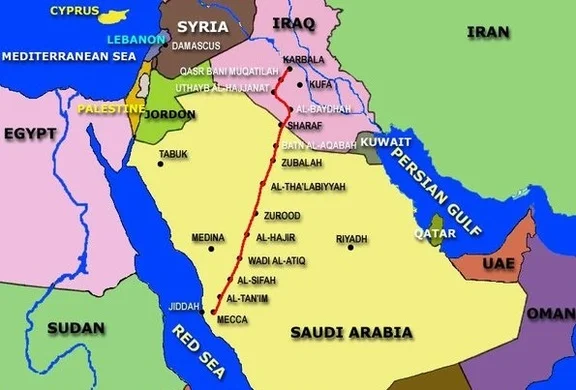
This battle took place between a small entourage consisting of the family and companions of Hussain ibn Ali (R.A), the grandson of the prophet Muhammad (PBUH) and son of the fourth caliph Ali ibn Abi Talib (R.A) against the military troops sent by Yazid ibn Muawiyah, the Umayyad Caliph at that time.
Since the martyrdom of Ali ibn Abi Talib (R.A), the Muslims in Kufa pledged allegiance to Hasan ibn Ali (RA) as successor to his father’s Caliphate.
However, Muawiyah from the Umayyads felt he was more worthy of being a leader than Hasan and had ambitions to seize that power.
Hasan (R.A), who was a peacemaker, relented by handing over his power to Muawiyah through a peace treaty.
The terms of the Hasan-Muawiyah treaty were that Hasan would become caliph after Muawiyah. If anything happens to Hasan, then the leadership will be taken over by Hasan’s little brother, Hussain (R.A).
But Muawiyah breaches the treaty. When Hasan (R.A) died being poisoned, Muawiyah handed over his leadership to his own son, Yazid ibn Muawiyah, and not to Husayn.
When Yazid rose to power, he sent the governor of Madina, Walid ibn Utba ibn Abu Sufyan to secure allegiance from Hussain Ibn Ali (R.A). However, Hussain (R.A) refused to pledge allegiance, then moved to Makkah with his family.
While in Makkah, Hussain (R.A) received many letters from the people of Kufa asking him to go to Kufa. The people of Kufa, who were dissatisfied with Yazid’s leadership, asked Husayn to come to Kufa and promise to pledge allegiance to him.
Hussain (R.A) finally sent Muslim bin Aqil (R.A) to find out the state of Kufa. When he got there, the Muslim wrote a letter to Hussain (R.A) telling him that the people of Kufa were ready to welcome him.
Yazid heard the presence of Muslim ibn Aqil (R.A) in Kufa, and he then ordered someone to kill him. He also changed the governor of Kufa, from Numan ibn Bisyr to Ubaidillah ibn Ziyad.
Without knowing about the changing condition in Kufa, Hussain (RA) still left for Kufa. Imam Hussain (R.A) and his companions consisting of 128 people departed from Medina to Kufa on 8 Dhul al-Hijjah 60 AH (9 September 680 CE). It was only when on the road that he received the news of the death of Muslim ibn Aqil (R.A), but he still decided to continue his journey to Kufa.
Hussain (R.A) and his companions arrived in Kufa on 2 Muharram 61AH (2 October 680). The next day, the Kufa army of 4000 men led by Umar ibn Sa’d approached Husayn’s entourage.
Ibn Saad’s army prevented Hussain (R.A) and his companions from accessing the Euphrates River. Hussain (R.A) and his entourage stayed in their camp thirsty without water.
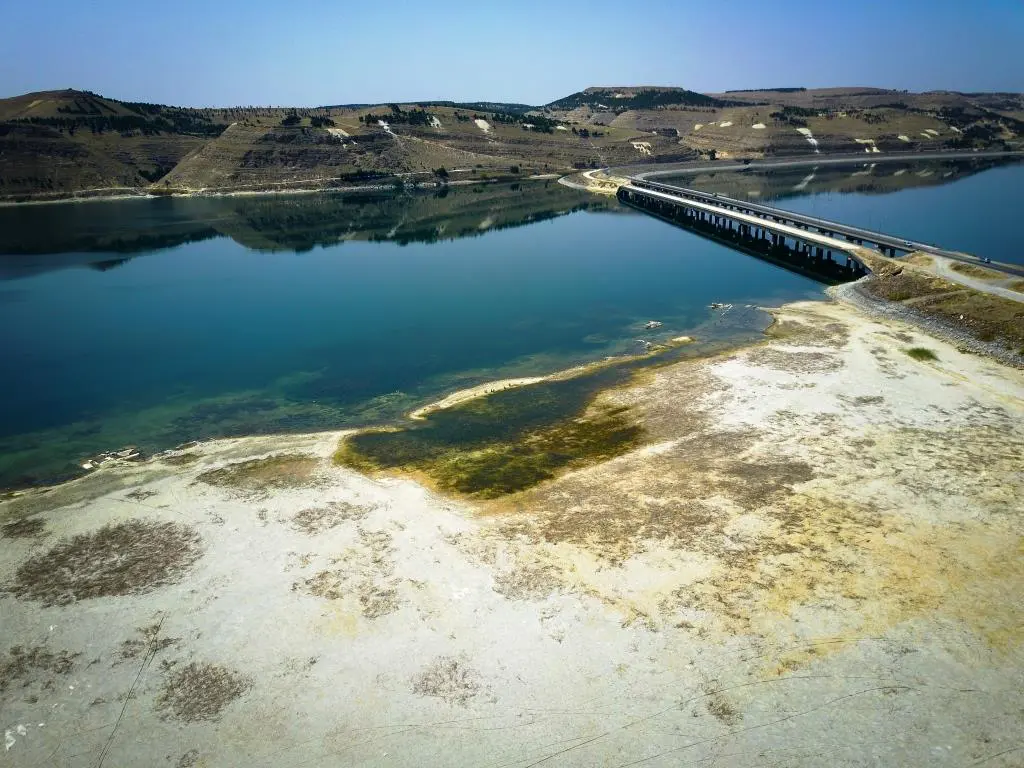
On the third day without water, a group of 50 men led by his half-brother Abbas Ibn Ali (RA) managed to draw water from the river even though they could only fill 20 water skins.
Eventually, when Abbas ibn Ali (R.A) went to the river to get water for the children at Hussain’s camp, he was surrounded by hundreds of soldiers who tried to prevent him from taking water.
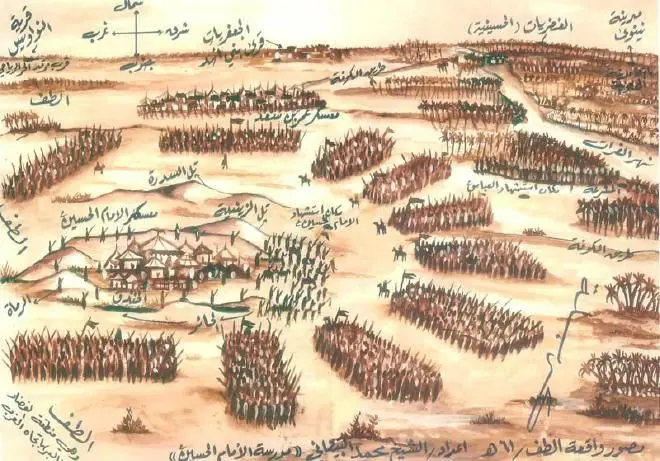
He was pulled down from his horse, and the soldiers who attacked cut both of his arms off, leaving his teeth to carry water bags.
He kept running to deliver the water even though stones and arrows rained down on him from all sides until an arrow hit the water bags he was carrying. He started to lose hope at that moment until a man hit him on the head until fell to the ground. Hussain (R.A) immediately came to him. Abbas (R.A) then died on Husayn’s lap.
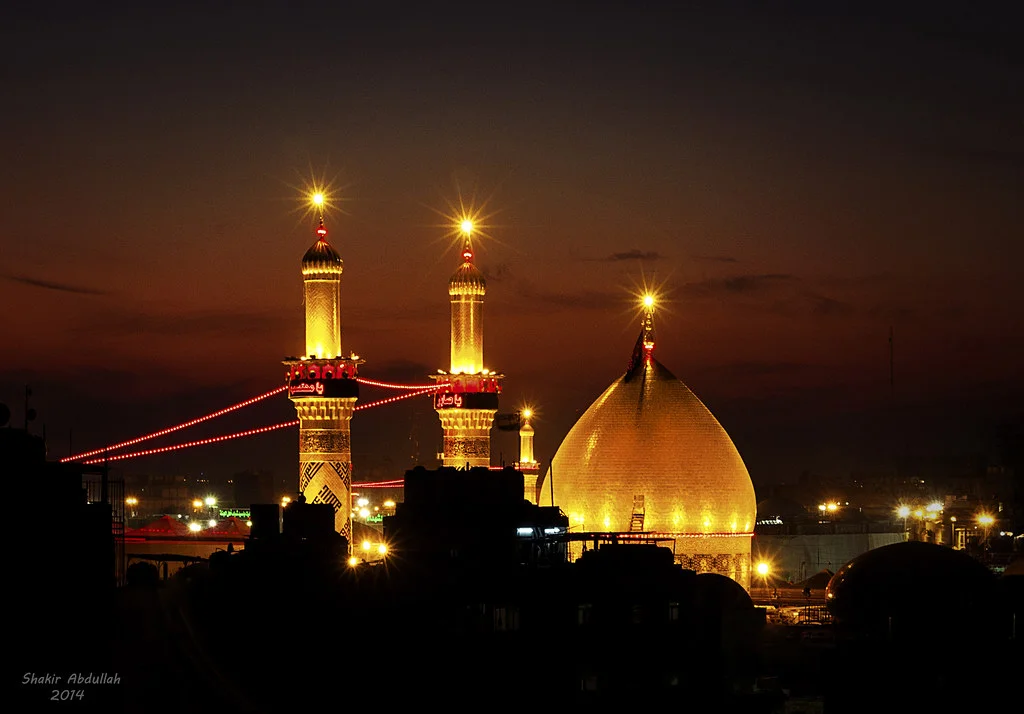
After the morning prayer on the 10th of Muharram, Hussain (R.A)’s side consisted of 72 people: 32 horsemen and 40 footmen bravely fought the armed forces led by Umar bin Sa’d, numbering 4,000-10,000 people.
Before the battle, Hussain (R.A) delivered a speech, reminding the Umayyad soldiers to return to the path of Allah SWT, which resulted in Hurr ibn Yazid and several others turning to defend Hussain (R.A).
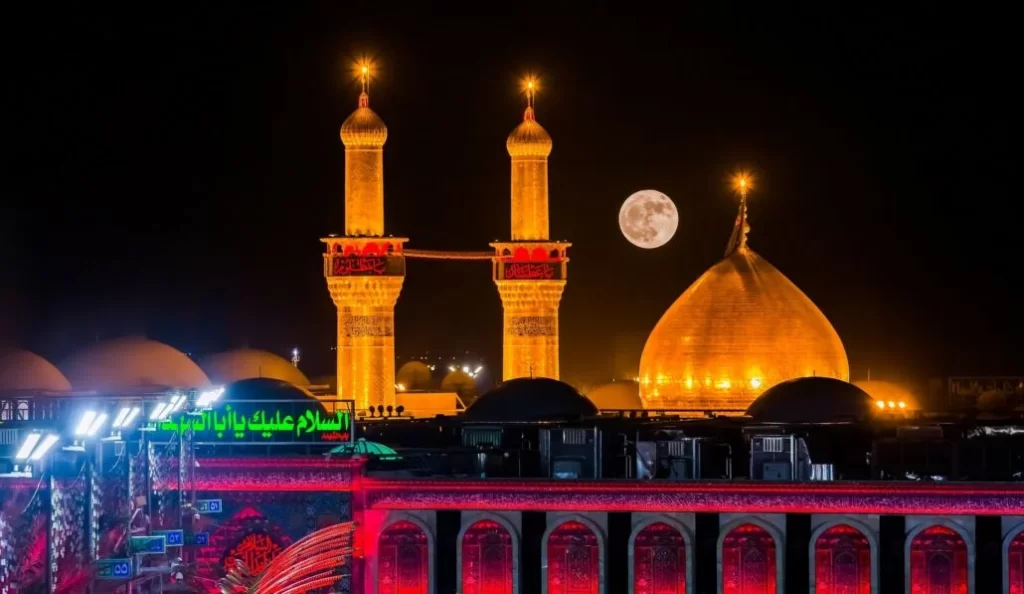
This battle of Karbala lasted until the evening. Even though Hussain (RA)’s army steadfastly fought ibn S’add’s army, they were still outnumbered. As many as 70 of Hussain (RA)’s side died lying weak on the ground, while Hussain (RA), who had been seriously injured, continued to fight ibn Sad’s troops until he died because a poisoned arrow hit him.
The battle of Kerbala ended with the victory obtained by ibn Saad’s troops.
What happened after Karbala – After The Battle
The troops who fell from the Umaayah side were 88 people. On the other hand, Hussain (R.A) and his companions were beheaded and taken to Damascus.
After the surviving soldiers left the battlefield, the locals buried the headless bodies of Hussain (R.A) and his companions there.
Both Shia and Sunni Muslims consider this site as one of the sacred sites because it reminds them of the courage and fortitude of Hussain (R.A) and his companions.
Hussain (R.A)’s belongings were looted, and the women left behind by Hussain (R.A)’s companions were imprisoned and presented in front of Yazid, later sent back to Medina.
Hussain (R.A)’s death had the opposite effect on what Yazid may have thought before. Hussain (R.A)’s death during the Karbala incident sparked hatred and resistance to Yazid’s rule and the Ummays in general.
10 Muharram:
To this day, the death of Hussain (RA) and his companions are commemorated by Sunni and Shia Muslims on the 10th of Muharram every year on the Islamic calendar, which peaks on the tenth day, commonly known as Ashura Day.
The Muslim community even holds the Ashura event, which is held every year on the 9th to 10th of Muharram to relive the incident of Karbala.
Hussain (R.A)’s death became the center of Shia belief and has a special place for Sunni beliefs. both saw Hussain (R.A) as someone who fought against oppression. Hussain (R.A) became a person whom they greatly admired for his courage, sacrifice, and fortitude.
72 martyrs of Karbala names:
72 names of martyrs who died at the battle of Karbala along with Husayn ibn Ali to fight against oppression.
The following is a list of the names of the martyrs who died from Husayn’s entourage in the Battle of Karbala that we managed to collect from several reliable sources:
- Imam Husayn ibn Ali ( grandson of the Prophet Muhammad and son of the fourth caliph Ali ibn Abi Talib )
- Ali al-Akhbar ibn Husayn ibn Ali (Son of Husayn ibn Ali)
- Ali al-Ashgar ibn Husayn ibn Ali (six-month-old baby boy of Husayn ibn Ali)
- Abbas ibn Ali (Half-brother of Husayn ibn Ali and son of Ali ibn Abi Thalib)
- Jaffar ibn Ali (Half-brother of Husayn ibn Ali and son of Ali ibn Abi Thalib)
- Abdullah ibn Ali (Half-brother of Husayn ibn Ali and son of Ali ibn Abi Thalib)
- Uthman ibn Ali (Half-brother of Husayn ibn Ali and son of Ali ibn Abi Thalib)
- Muhammad ibn Ali (Son of Ali ibn Abi Thalib)
- Abu Bakr ibn Hasan ibn Ali ( Son of Hasan ibn Ali and grandson of Ali ibn Abi Thalib)
- Abdullah ibn Hasan ibn Ali (11-year-old son of Hasan ibn Ali and grandson of Ali ibn Abi Thalib)
- Qasim ibn Hasan ibn Ali ( Son of Hasan ibn Ali and grandson of Ali ibn Abi Thalib)
- Aun ibn Abdullah ibn Ja’far al Tayyar (Son of Zaynab bint Ali and grandson of Ali ibn Abi Thalib )
- Muhammad ibn Abdullah ibn Ja’far al Tayyar (Son of Zaynab bint Ali and grandson of Ali ibn Abi Thalib )
- Ja’far ibn Aqeel (Son of Aqeel ibn Ali and grandson of Ali ibn Abi Thalib)
- Abdullah ibn Muslim ibn Aqeel (Son of Aqeel ibn Ali and grandson of Ali ibn Abi Thalib)
- Abu Abdullah ibn Muslim ibn Aqeel (Son of Aqeel ibn Ali and grandson of Ali ibn Abi Thalib)
- Muhammad ibn Abu Saeed ibn Aqeel (Son of Aqeel ibn Ali and grandson of Ali ibn Abi Thalib)
- Sulaiman (Slave of Imam Husayn)
- Qaarib (Slave of Imam Husayn)
- Munjeh (Slave of Imam Husayn)
- Muslim ibn Ausajah al Asadi (Was a companion of Prophet Muhammad and helped Husayn ibn Ali in Karbala)
- Saeed ibn Abdullah al Hanafi (He carried letter from Muslim ibn Aqeel from Kufa to Husayn and died protecting Husayn from arrows )
- Bishr Ibn Amr al Khadhrami (a devotee of Muhammad)
- Yazeed ibn al Haseen
- Imran ibn al Kalb al Ansari
- Na’eem ibn al Ajlan al Ansari
- Zuhair ibn al Qain al Bajali ( a follower and a staunch devotee of Husayn ibn Ali)
- Amr ibn Qurzah al Ansari
- Habeeb bn Mdhahrir al Asadi
- Hurr ibn Yazeed ibn Muawiyah (a commander of the Umayyad who turns to defend Husayn along with six others and the son of Yazid ibn Muawiyah)
- Abdullah ibn al Umair al Kalbi
- Nafe ibn al Hilal Al Jamali al-Muradi
- Anas ibn Khalil ibn al Harth al Asadi
- Qais ibn al Mussahar al Saedawi
- Abdullah ibn Urwah ibn al Harraaq al Ghifaaree
- Abdul Rahman ibn Urwah ibn al Harraaq al Ghifaaree
- Shabeeb ibn Abdullah Nahshahi
- Jaun (Slave of Abu Dharr al-Ghifaree)
- Hujjaj ibn Zaid Sa’di
- Qasit ibn Zuhair al-Tha’labee
- Kursh (Muqsit) ibn Zuhair al-Tha’labee
- Kinaanah ibn Ateeq
- Dhargham ibn Malik
- Jowain ibn Maalik al-Dhaabai
- Zaid ibn Thubait al-Qaesi
- Abdullah ibn Zaid ibn Thubait al-Qaesi
- Ubaidullah ibn Zaid ibn Thubait al-Qaesi
- Amir ibn Muslim
- Qan’nab ibn Amr al-Namari
- Salim (Slave of Amir ibn Muslim)
- Saif ibn Malik
- Zuhair ibn Bashi al-Khath’ami
- Zaid ibn Me’qal al-Jo’afi
- Hujjaj ibn Masrooq al-Jo’afi (Was a companion of Ali ibn Abi Thalib)
- Mas’ood ibn Hajjaj
- Son (name not known) of Mas’ood ibn Hajjaj
- Majma’ ibn Abdullah al-Aezi
- Ammar ibn Hassan ibn Shuraib al-Taai
- Hayyan ibn Harrith al-Salmaani al-Azdi
- Jundab ibn Hujair al-Khanlani
- Umar ibn Khalid al-Saedaawi
- Saeed (Slave of Umar ibn Khalid)
- Yazid ibn Ziad ibn Mazahi al-Kindi
- Zaahir (Slave of Amir ibn Humuq al-Khuzaa’ee)
- Jabalah ibn Ali al-Shaybani (He served in Ali ibn Abi Thalib’s companions in the Battle of Siffin as well)
- Saalim (Slave of Bani Medinat al-Kalbi)
- Aslam ibn Khateer al-Azdi
- Zuhair ibn Sulaim al-Azdi
- Qasim ibn Habeeb al-Azdi
- Umar ibn al-Ohdooth al-Hadhrami
- Abu Thamaamah, Umar ibn Abdullah al-Saaedii
- Hanzalah ibn As’ad al-Shami (He carried the message exhortation from Husayn ibn Ali to Umar ibn Sa’ad in Karbala)
Other names;
- Abdul-Rahman ibn Abdullah al-Arhabi
- Ammaar ibn Abu Salaamah al-Hamdaami
- Aabis ibn Shaabeeb al-Shaakiree (He helped Muslim ibn Aqeel in Kufa and also joined Husayn’s entourage in Battle of Karbala)
- Shaozab (Slave of Shaaki)
- Shabeeb ibn Haarith ibn Saree
- Maalik ibn Abdullah ibn Saree
- Sawwar ibn Abi Uman al-Nohami al-Hamdani (he was traveled from Iraq to Joined Husayn’s entourage)
- Amar ibn Abdullah al-Junda’i (a man from the tribe of Hmadan)
Who is the first martyr of Karbala?
Muslim Ibn Aqil (RA)
Names of females in Karbala
Umme Rabab (Ali Asghar’s Mother)
Umme Farwah (Wife of Hasan Ibn Ali [RA])
Ummul Baneen (Mother of Abbas [RA])
Umme Kulthoom (Hussain [RA]’s youngest sister)
Fatima Kubra
Fatima Sughra (Elder daughter of Hussain [RA])
Sakina (Daughter of Hussain [RA])
Bibi Zainab (Hussain [RA]’s elder sister)
Who won the battle of Karbala?
Perceived victory obtained by Yazid ibn Muawiyah along with ibn Saad’s troops after mercilessly martyring Hussain Ibn Ali (R.A), grandson of Prophet Muhammad (PBUH).
Detail Credit : The Islamic Information

